Jobs in Canada for Filipino 2025

Are you a Filipino looking for a job opportunity in Canada?
It’s no secret that many Filipinos immigrate to Canada for a better life for themselves and their family. Benefits such as higher wages, free healthcare, and free education for children are all very appealing.
In this comprehensive guide, you’ll learn how to get a job in Canada from the Philippines, plus tips and tricks to help you get one step closer to your Canadian dream.
Let’s get started.
Related: How to Immigrate to Canada: An Ultimate Guide for Filipinos
Table of Contents
Top 10 Most In-Demand Jobs in Canada for Filipinos
The Philippines Overseas Employment Administration (POEA), now known as the Department of Migrant Workers or DMW, keeps and updates a database of job vacancies in Canada as their accredited recruitment agencies provide. Using the data from their database, here are the top 10 most in-demand jobs in Canada for Filipinos:
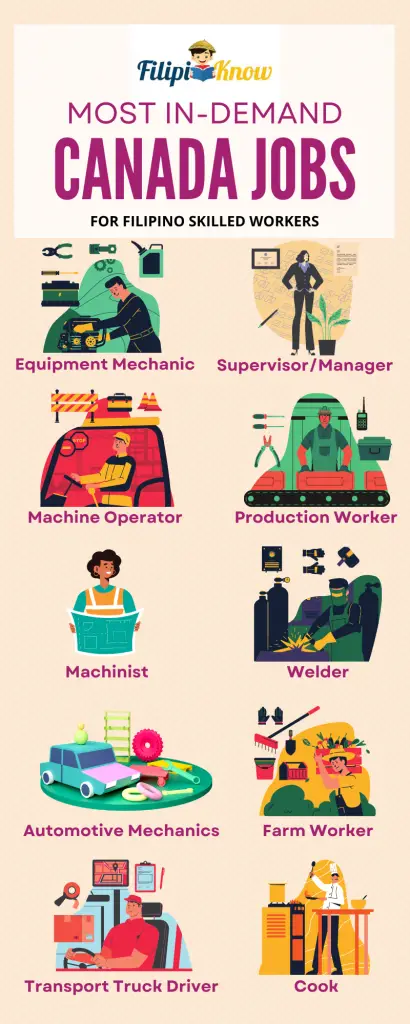
1. Equipment Mechanics
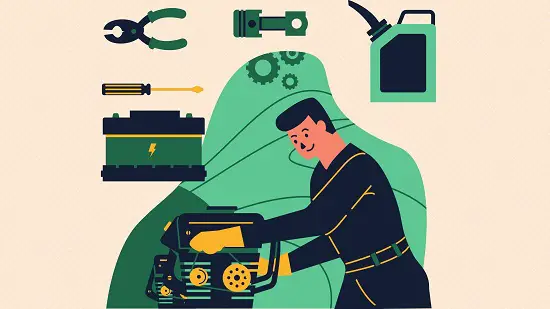
Job Overview: Heavy-duty equipment mechanics check and maintain construction, agricultural and industrial equipment necessary for day-to-day operations. Heavy-duty equipment and electrical mechanics are in high demand among Canada’s agricultural and industrial sectors.
Industrial mechanics work in manufacturing plants, utilities, and other industrial establishments. Agricultural mechanics work in farms, greenhouses, and livestock production facilities.
Salary: From $20/hour to $47/hour (in Canadian Dollars), as the Canadian Government’s Job Bank Website reports.
Requirements:
- Education: Finishing secondary school is usually required. This is the equivalent of a high school diploma in the Philippines.
- Experience & Certification: Finishing a 3-4 year apprenticeship program OR a combination of 5+ years of work experience in the trade AND some high school, college, or industry courses in industrial machinery repair or millwrighting is usually required to be eligible for trade certification.
- Specialized mechanics may require additional trade certification. For example, textile machinery mechanics hired from other industries may require additional training in textile processes and experience as a textile manufacturing machinery operator.
Job Variations: Mechanic Agricultural Equipment, Electromechanic, Mechanic Industrial, Millwright
2. Supervisors and Managers

Job Overview: A supervisor or manager oversees the staff’s work to complete business objectives correctly. They also oversee staff training, customer complaint resolution, marketing implementation, revenue monitoring, and other day-to-day business operations. Supervisors and managers are in demand in Canada’s food service, hotel, and manufacturing industries.
Salary: From $12/hour to $40/hour
Requirements:
- Education: Finishing secondary school is usually required
- Experience: At least two years of experience in the corresponding industry
- There may be additional requirements depending on the industry. For example, supervisors in manufacturing plants may be required to be physically fit or to know how to operate a forklift.
Job Variations: Supervisor Fast Food, Supervisor Housekeeping, Manager Restaurant
3. Machine Operators

Job Overview: Machine operators are responsible for using highly specialized machines to complete tasks for the business. Machine operators usually work in the manufacturing and construction industries.
Those working in the manufacturing industries use machines to make high-quality products that the company sells. Meanwhile, machine operators in construction typically use heavy equipment such as bulldozers and excavators.
Salary: From $14/hour to $30/hour
Requirements:
- Education: Finishing secondary school is usually required
- Experience & Certification: Finishing a 1 to 3-year apprenticeship program OR high school, college, or industry courses in the specific machine operated are usually required
- Trade certification in the specific machine operated may be required depending on the province or territory
- Since this is a physically demanding job, physical fitness may be required
Job Variations: Heavy Equipment Operator, Lead-Bindery Machine Operator, Logging Machinery Operator
4. Factory Workers/Production Workers
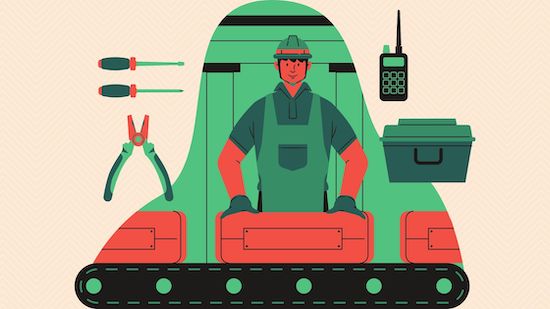
Job Overview: Production workers are responsible for making products in an industrial setting, such as those in factories for food, electronics, and other products. They usually work in highly specialized individual stations, performing product assembly, sorting, and quality control tasks.
Salary: From $12/hour to $35/hour
Requirements:
- The requirements for production workers aren’t as strict as the other jobs on this list. It’s up to the employer to decide. Some companies require work experience and educational level, but other employers don’t need these requirements.
Job Variations: Worker Foundry, Worker Food Processing, Factory Worker
5. Machinists

Job Overview: Unlike machine operators, machinists operate heavy machinery and have the knowledge to set up these machines. They set up and operate machines that cut or form metal, wood, plastic, and other materials to create precise parts and products. Their tasks include reading engineering plans, directing machine operations, and repairing machine tools.
Salary: From $16/hour to $35/hour
Requirements:
- Education: Finishing secondary school is usually required
- Experience & Certification: Finishing a 4-year apprenticeship program OR a combination of 4+ years of work experience in the trade AND some college or industry courses in machining is usually required to be eligible for trade certification
- Trade certification for machinists is voluntary in all provinces and territories
- Trade certification for machinists (CNC) is available but voluntary in New Brunswick, Québec, and Manitoba
Job Variations: Machinist CNC, Machinist Conventional, Machinist/Mold Maker
6. Welders
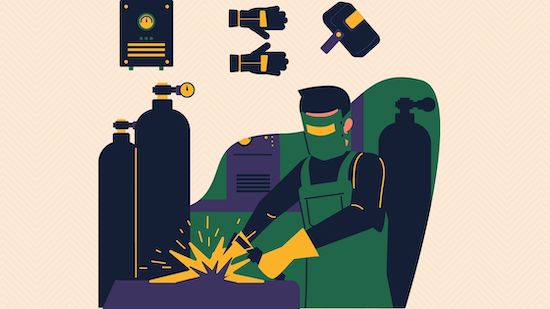
Job Overview: Welders use welding equipment to join metal parts such as pipes, sheets, and other components used in manufacturing and construction. Their tasks include interpreting welding process specifications, operating flame-cutting, soldering, and metal-shaping equipment, and conducting welding quality and tolerance tests.
Salary: From$18/hour to $40/hour
Requirements:
- Education: Finishing secondary school is usually required
- Experience & Certification: Finishing a 3-year apprenticeship program OR a combination of 3+ years of work experience in the trade AND some college or industry courses are usually required to be eligible for a trade certification
- Trade certification is compulsory in Alberta and available but voluntary in all other provinces and territories.
Job Variations: Welder Production, Welder Fabrication, Welder/Assembler
7. Automotive Mechanics, Painters, and Body Workers

Job Overview: Automotive mechanics, painters, and bodyworkers keep cars, trucks, and other vehicles running smoothly for businesses and individual customers. Their tasks include running diagnostic tests, doing routine maintenance, and repairing or replacing broken parts.
Salary: Starts from $15/hour to $38/hour
Requirements:
- Education: Finishing secondary school is usually required
- Experience & Certification: Finishing a 4-year automotive service technician apprenticeship program OR a combination of 4+ years of work experience in the trade AND high school, college, or industry courses in automotive technology is required to be eligible for trade certification
- Trade certification for automotive service technicians is required in Nova Scotia, Prince Edward Island, New Brunswick, Québec, Ontario, and Alberta; and available, but voluntary, in Newfoundland and Labrador, Manitoba, Saskatchewan, British Columbia, the Yukon, the Northwest Territories, and Nunavut
- Certifications for automotive service technicians in the transmission, steering, suspension, and brakes specializations may be required depending on the province
- Truck and trailer mechanics are classified differently and need their certifications.
Job Variations: Mechanic Automotive, Automotive Painter & Repairer, Denter Automobile, Mechanic Road Truck
8. Farm Workers

Job Overview: A farmworker is a laborer in the agricultural industry. They may be assigned tasks such as caring for livestock, cultivating and harvesting crops, and maintaining farm equipment.
Salary: From $12/hour to $27/hour
Requirements:
- There are no specific education or training requirements.
- Education and experience related to farming will make you more appealing to employers
Job Variations: Worker Agricultural, Herdsperson Swine, Worker Greenhouse
9. Transport Truck Drivers

Job Overview: Transport truck drivers operate heavy trucks to transport goods over short and long distances. They are usually employed in the manufacturing, logistics, and construction industries. Their duties include doing preventive maintenance, ensuring the safety of their cargo, and coordinating with the company’s dispatch team.
Salary: From $15/hour to $33/hour
Requirements:
- Education: Finishing secondary school is usually required
- Certification: Finishing an accredited driver training course of up to 3 months duration, through a vocational school or community college may be required
- A license or certification may be required to drive long combination vehicles, straight-body trucks, vehicles equipped with air brakes, and other special trucks.
- Transportation of dangerous goods (TDG) certification is required for drivers transporting hazardous products or dangerous goods.
Job Variations: Long Haul Truck Driver, Flatbed Truck Driver, Truck-Trailer Driver
10. Cooks

Job Overview: A cook prepares various foods in a restaurant, hospital, school, hotel, or other establishment. A cook handles tasks such as ordering supplies, cooking meals, planning menus, and cleaning the kitchen.
Salary: From $12/hour to $20/hour
Requirements:
- Education: Finishing secondary school is usually required
- Experience & Certification: Finishing a 3-year apprenticeship program for cooks OR finishing college or other programs in cooking OR several years of commercial cooking experience are required
- Some establishments require a food sanitation and hygiene certificate
Job Variations: Line Cook, BBQ Cook
Filipinos in Canada: An Overview
Since the 1930s, many Filipinos have decided to call Canada their home.
As of April 2018, there are a total of 901,218 Filipinos in Canada (or 2.6% of Canada’s national population) who came to the country as temporary foreign workers (TFWs), permanent residents, or naturalized Canadians1.
The statistics show significant growth as it was only two years earlier when the census reported 837,130 people identifying as having Filipino ethnic origin (see image below).
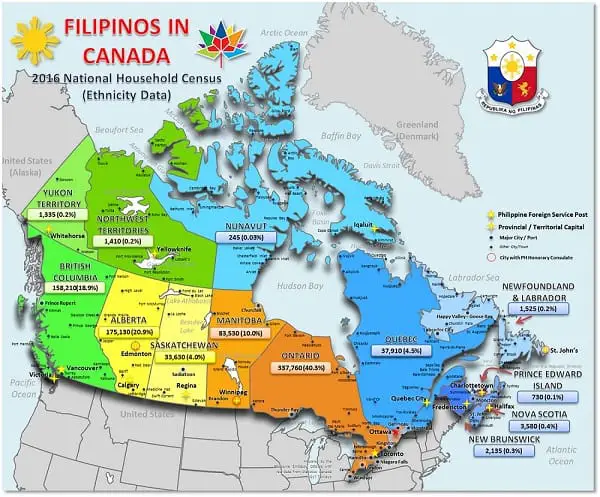
Today, the Philippines remains a leading source of immigrants to Canada, followed by India, China, and Iran.
Most Filipinos initially work in Canada as temporary foreign workers and then apply for permanent resident status once they get the opportunity.
As a Canadian citizen/permanent resident, you have plenty of privileges. These include sponsoring your family members–including your parents and grandparents–for Canadian immigration.
Not only are you helping to improve your social status by working in Canada, but you are also indirectly saving the Philippine economy. In fact, in 2017 alone, remittances from Filipinos in Canada increased by 12.6% (from USD 572,820,000 in 2016 to USD 644,754,000 in 2017).
Why Work in Canada?
Canada has consistently ranked among the best countries in the world for immigrants because of its outstanding healthcare system, spectacular natural beauty, stable economy, plenty of job opportunities, and overall excellent quality of life.
The country is also ideal for Filipinos who prefer to study before finding a job. Unlike its neighboring country, the US, Canada allows students to work 20 hours a week, either on or off-campus.
In addition, you can bring your spouse with you and let him/her work full-time for the duration of your studies, something that international students in the US with F-2 status aren’t allowed to do.
Most importantly, working in Canada as a temporary foreign worker gives you a once-in-a-lifetime chance to upgrade to permanent resident status.
Aside from living in a country that genuinely values your hard work, you’ll also gain Canadian citizenship with a passport that can take you anywhere without applying for a visa.
Related Article: How to Get a Philippine Passport: An Ultimate Guide
How To Work in Canada: A Step-by-Step Guide for Filipinos
1. Know Your Options and Eligibility

Two things may hamper you from finding a job in Canada: It’s either you (1) don’t have the necessary qualifications, skills, and employment background, or you are (2) “inadmissible,” meaning you are not allowed to come to Canada under Canada’s immigration law2.
If you don’t fall in the second category, you may have the chance to work in Canada, assuming you have the right skills.
Canada offers different programs for immigrants. It will be up to you if you prefer to be a permanent resident upon arrival in Canada or be employed as a temporary foreign worker.
a. Express Entry
If you want to work and move to Canada permanently, you must be a skilled worker qualified in one of the three Express Entry programs:
- Federal Skilled Worker (FSW) program requires Filipino applicants to have the education, language ability, and skilled work experience in any of Canada’s 300+ eligible occupations. This is a point-based system, so once you enter the Express Entry pool, you’ll be ranked according to the points you earn. The highest-ranking applicants are usually invited to apply for permanent residence.
- Federal Skilled Trades Program (FSTP), launched in January 2013, puts more value on one’s practical training than formal education. To qualify for FSTP, the applicant must have at least two years of work experience within the last five years in one of the eligible skilled trades.
- Canadian Experience Class is for those with skilled work experience in Canada.
In addition to the three Express Entry programs above, you may also be picked through the Provincial Nominee Program (PNP), which is for people who have the qualifications and have been nominated by a specific Canadian province/territory to immigrate to Canada.
You can fill out this form to find out if you’re eligible for any of the three Express Entry programs above.
Based on your answers, the system will determine if you’re qualified for any of the programs and what you need to do next in case you are. You will also be added to the pool of candidates for immigration and possibly get an invitation to immigrate.
Here’s a caveat: If you apply for any of the above-mentioned programs, it may take ages before your application can be approved–especially if you have no qualifying job offer.
This is when the Temporary Foreign Worker (TFW) program comes into the picture.
b. Temporary Foreign Worker (TFW) program
Under this program, Filipinos are hired by employers who can prove that there’s a shortage of people in Canada with the skills and experience they’re looking for.
Hard-working Filipinos consider the TFW program a stepping stone to becoming Canadian citizens. This is because after gaining enough experience, they can apply for permanent resident status through the Canadian Experience Class.
UPDATE: Starting April 30, 2022, job-seekers may take advantage of the changes in the Temporary Foreign Worker (TFW) program3 as some businesses in Canada are now allowed to hire more low-wage workers to address labor shortages. Most of these businesses belong to the following sectors:
- Foodservice
- Hotel
- Hospitality service
- Accommodation
- Fish and seafood processing
Furthermore, changes in the TFW program include:
- 18-month Labor Market Assessment validity
- Removed limit on the number of low-wage positions in seasonal industries
- 3-year work permit for high-wage workers
2. Search for a Job

You’ve probably decided which path to getting a job in Canada best fits you. Of course, the next step would be finding an employer willing to hire you.
If you’re eligible for the Express Entry programs and want to become a permanent resident in the shortest time, I encourage you to apply through the Job Bank.
The Job Bank is Canada’s official job site which matches Express Entry candidates with eligible employers. Express Entry candidates with job offers earn higher points, not to mention the convenience of arriving in Canada with a job already waiting for you.
Filipino caregivers and other skilled workers who want to go to Canada under the Temporary Foreign Worker (TFW) program can find jobs at recruitment agencies accredited by the Philippine Overseas Employment Administration or POEA (now the Department of Migrant Workers or DMW).
A 2018 notice from the website of the Philippine Overseas Labor Office (POLO) in Vancouver reveals that the direct hiring of Filipinos has been put on hold, and only those that the members of the diplomatic corps have hired, international organizations, high-ranking government officials, and other qualified employers are exempted from this ban.
As a result, the only way for most Filipinos to get a job in Canada is through a POEA-accredited recruitment agency.
To find out which agencies in the Philippines have a valid license, go to this link and enter any name of the recruitment agency you’re dealing with to verify its legitimacy.
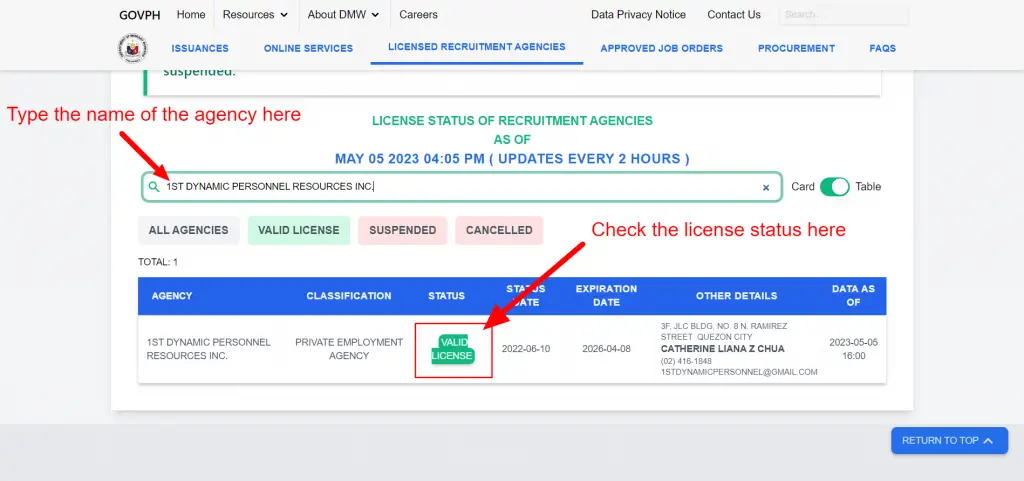
Take note that the license has a validity period of 4 years. The list of recruitment agencies with valid licenses may change without prior notice, so check the link before applying to any job opening.
Updated List of Licensed Recruitment Agencies for Canada Employment.
For this list, we’ve only chosen recruitment agencies with valid licenses and accessible websites. This list doesn’t attempt to be comprehensive, as recruitment agencies tend to renew their licenses without prior notice. So please research and check the agency’s legitimacy using the guideline we suggested previously.
- Mercan Canada Employment Philippines, Inc. This private employment agency is at U502 & 506 Galleria Corporate TWR Edsa Cor Ortigas, Quezon City. You may contact them via their official website, email address ([email protected]), or telephone (9108010 – 14).
- 1st Dynamic Personnel Resources Inc. This is another private employment agency with an office at 3F, JLC Bldg., No. 8 N. Ramirez Street, Don Manuel, Quezon City. To inquire about available job orders, you can reach them through their official website, email address ([email protected]), or telephone (02)416-1848.
- Advance Productions Inc. This employment agency accepts applications for manpower pooling of Filipino caregivers, construction workers, and other skilled and semi-skilled workers. Their office is located at #5 Morning Glory St., Brgy. Pilar Village, Las Piñas. You can contact them via their official company website, email address ([email protected]), or one of the following telephone numbers: (02)8058716/09177089400/09209674755.
- EDI-Staffbuilders International Inc. is a private employment agency with offices at Units 701, 703, and 704 Corporate Center, 139 Valero St., Salcedo Village, Makati. Although they have an official website, it’s not as user-friendly as other agencies’ websites on this list. Nevertheless, you can contact them regarding available job orders through their official email address ([email protected]) and telephone numbers at 8126703 – 04/8921814.
- Industrial Personnel and Management Services, Inc. (IPAMS). This company is a private employment agency with an office at IPAMS Bldg., 723 Aurora Blvd., New Manila, Quezon City. You can inquire about one of their numerous Canada job orders through their official website, email address ([email protected] / [email protected]), or one of these telephone numbers: 234-5640/234-5641/(+632)8234-5635.
- International Staffing Organization, Inc. This is an employment agency with an office address at 5F PDCP Bank Ctr Bldg., V.A. Rufino St., Salcedo Village, Makati. To make inquiries about their job orders available for manpower pooling, you can go straight to their website or contact them via email ([email protected]) or telephone number 8121129.
- Magsaysay Global Services, Inc. This is a land-based manpower agency with offices in the Philippines, China, and Indonesia. Their Philippine office is at G/F, Suite 1A and 2/F, G.E. Antonio Bldg., J. Bocobo Cor. T.M. Kalaw St., Manila. Magsaysay Global Services Inc. can be reached through their official website, email address ([email protected]), and telephone numbers 8628-9600/5672222 EXT 9781.
- OMANFIL International Manpower Development Corporation. One of the biggest manpower agencies in the Philippines, OMANFIL has recruited thousands of Filipinos to different countries worldwide since 1978. You can contact the company via its official website, email address ([email protected]), and telephone numbers 8211650-55/8222141-45.
- Peridot International Resources, Inc. Established in 2000, this Filipino-owned overseas land-based recruitment agency has an office address at Units A & B 1845 Dian cor. Boyle Streets, Palanan, Makati. For inquiries, you may contact them via email ([email protected] / [email protected]) or telephone numbers 5527826 / 09998899242 / 09275747652 / 09258833288.
How To Search for Canadian Jobs via POEA/DMW Website
For the latest job vacancies in Canada, go to this link and choose “Job Site” from the first drop-down box. Enter “Canada” in the search box so the system will show only the job orders available in Canada. Finally, click the Search button to display the results.
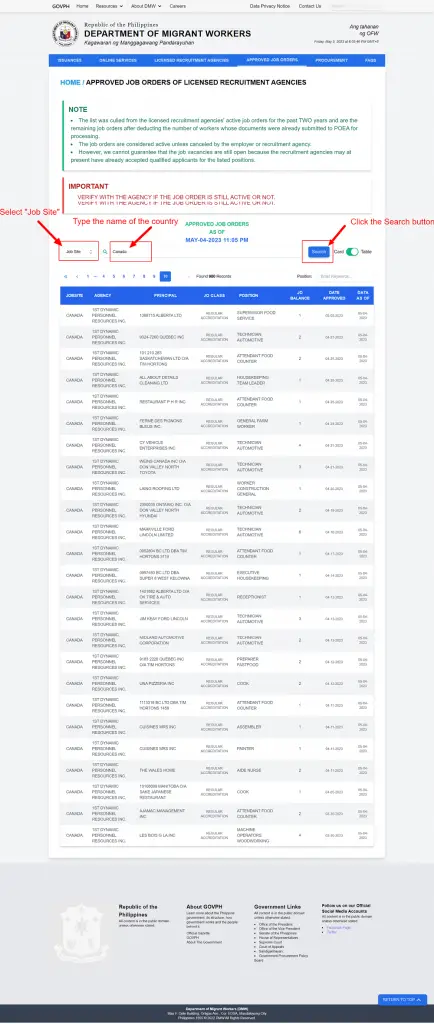
Some of the in-demand jobs in Canada that recruitment agencies in the Philippines are offering include, but are not limited to, the following:
- Caregiver
- Hairstylist
- Butcher
- Food Service Supervisor
- Welder
- Fast Food Restaurant Staff/Manager
- Assembler
- Nanny
- Apiary Worker
- Mechanic
- Machinist
- Cook
- Cleaner
- Seamstress
- Sawmill Operator
- Laborer
- Farm Worker
- Plater
The list above only shows some active job orders when I wrote this article. POEA or DMW doesn’t guarantee that the job orders are still active, so verify the job’s availability with the agency.
After ensuring the recruitment agency has a valid license, contact them via their website or Facebook page. Otherwise, call them and let them confirm if the job order is still available before you submit your application.
3. Wait for the Documentary Requirements To Arrive

After finding a prospective employer willing to hire you, you only need to wait for the necessary documents to arrive.
In Canada, employers who cannot find any Canadian available for the position they offer must apply for a Labor Market Impact Assessment (LMIA).
A positive LMIA means there’s no Canadian available to do the job, and there’s a need for a foreign worker (in this case, a Filipino) to fill the job vacancy. A positive LMIA is also called a confirmation letter.
Once the employer receives a positive result, he/she will send you the LMIA along with the job offer and contract.
As for the job offer, review specific details as soon as you receive the document. Important sections you must review include Salary and Benefits, Job Description, and Working Hours.
Never accept a job offer from someone asking you for money or your credit card information.
After receiving the required documents from your employer, you can now apply for a work permit (and temporary resident visa, if required).
Did you know? Not all employers are required to obtain LMIA. To verify if your job offer needs LMIA, check this link for the Labor Market Impact Assessment exemption codes.
4. Apply for a Work Permit
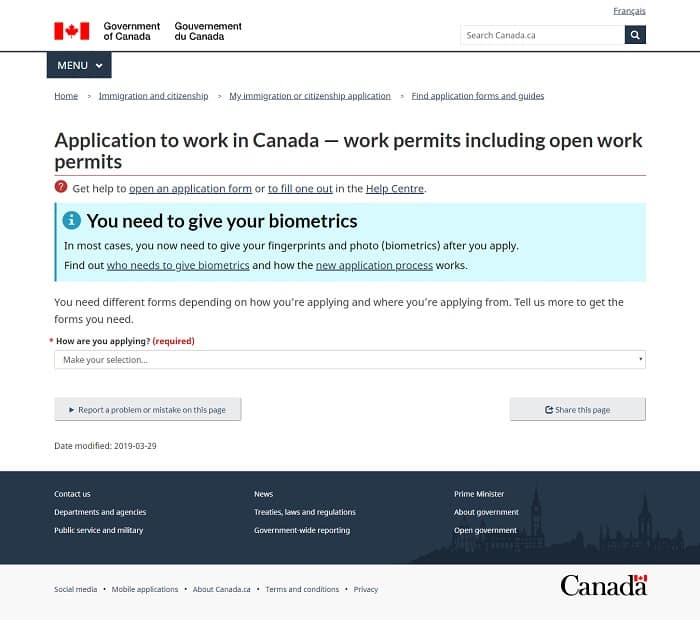
Now that you already have the LMIA and the job offer from your employer, you can apply for your work permit at designated visa application centers.
To apply for a work permit, you will need all of the following:
- Contract
- Job Offer Letter
- Copy of the Labor Market Impact Assessment (LMIA).
- LMIA Number
Take note that not all jobs require a work permit. Please refer to this link for a complete list of jobs that don’t need a work permit. If you don’t need such a permit, you must apply for a visa before going to Canada.
There are two types of work permits in Canada:
- An employer-specific work permit prohibits you from working for other employers except those initially hired you. This states the name of the specific employer you will work for in Canada, how long you’ll work, and the location/place where you’ll be employed.
- As its name suggests, an open work permit allows you to work openly for any employer in Canada. However, an open-work permit is only given to a limited number of candidates. Check out this list to know if you can get this work permit.
Not sure which type of work permit you’re qualified for? Answer the questions on this page to find out.
How to Apply for a Work Permit for Canada in the Philippines
a. Submit your application
You have the choice to apply either on paper or online.
However, an online application is recommended not only because it’s quicker and cheaper (no need to pay for courier fees), but it also ensures that you can submit additional documents quickly should they request them.
In addition, you can get real-time updates on the status of your application through your online account. To start applying for a work permit, go to this link.
b. Provide your fingerprints and photo (biometrics)
After submitting your application and paying the required biometrics fee, you’ll receive an instruction letter detailing how and where to give your biometrics (fingerprints and photos).
You only have up to 30 days to give your biometrics in person at designated application centers in the Philippines.
There is a Canada visa application center (CVAC) in Manila and another in Cebu where Filipino workers bound for Canada can provide their biometrics. You can visit this website for more info.
c. Undergo a medical exam
Once they’ve confirmed that the documents you’ve submitted are complete, you may be asked to go to an interview with Canada’s representative in the Philippines.
For some candidates, a medical exam is required. In case you need to go through a medical examination, you’ll be instructed by the representative who’ll interview you about where and how the medical exam will take place.
d. Wait for the approval letter
If your application is approved, you’ll receive a letter that says you can work in Canada within the time frame specified in your contract.
Remember, this letter is not your work permit. Bring this letter when you travel to Canada. The work permit is only issued to Filipino workers upon arrival in Canada.
5. Prepare To Become an Overseas Filipino Worker (OFW)

Now that you have a work permit, the Philippine government is the only thing standing between you and your dream job in Canada.
As a soon-to-be overseas Filipino worker (OFW), you must undergo the Pre-Employment Orientation Seminar (PEOS). The POEA/DMW offers this free service to teach aspiring OFWs about overseas job application procedures, the documents/costs involved, and ways to prevent illegal recruitment.
All Filipino workers bound for Canada must also apply for an Overseas Employment Certificate (OEC), which you show to the Philippine immigrant officials on your departure date so they can allow you to leave.
Related: How to Get an Overseas Employment Certificate (OEC) Through BM Online
6. Arrive in Canada

When you arrive in Canada, don’t expect the border services officer (BSO) to give you the work permit immediately.
You’ll go through a meticulous screening procedure to help them ensure you’re the same person approved to work in Canada.
After the initial identity check (during which your fingerprints are checked and compared against their records), you’ll be asked to present the following entry requirements:
- Port of Entry (POE) Letter of Introduction.
- Your passport.
- Your visa (if applicable).
- Travel documents like airline tickets, etc.
- Supporting documents such as a copy of your employer’s positive LMIA (if requested), proof of work experience/education, or offer of employment number (which your employer received after submitting the offer through the Employer Portal). The offer of employment number applies only to those exempted from submitting LMIA and arriving in Canada to work for a specific employer.
Related Article: How to Renew Philippine Passport in Canada: An Ultimate Guide
When the BSO confirms that you can enter Canada, they will print your work permit. The BSO will also stamp your passport and inform you how long you can stay in Canada.
Make sure you give honest answers when interviewed by the BSO. Filipino workers under the TFW program may be denied entry if they cannot prove to the BSO with their answers and documents that they will leave Canada at the end of their approved stay.
Tips and Warnings
- Get your credentials assessed before applying and moving to Canada. An assessment agency must assess your education, work experience, and professional credentials to confirm that you are fit to work there, particularly for regulated jobs. This will take time and money.
- Do your research to ensure that you are paid right. The general minimum wage in Ontario is $14.35/hour as of October 2021. Please note that it can differ per province or territory.
- Plan your living expenses. It’s not enough to look at the potential salary increase you get when deciding to move to Canada. In 2021, the average cost of living in Canada is $2,730 monthly. It’s even more expensive in highly populated cities such as Toronto. You should calculate your expenses to decide if it’s worth the move.
- Don’t forget about income taxes and mandated government contributions when calculating your potential earnings.
References
- Conchas, A. Filipinos in Canada. Retrieved 22 October 2019, from https://ottawape.dfa.gov.ph/index.php/2016-04-12-08-34-55/filipino-diaspora
- About inadmissibility. Retrieved 22 October 2019, from https://www.canada.ca/en/immigration-refugees-citizenship/services/immigrate-canada/inadmissibility.html
- Carmona-Newman, M. (2022). Filipino Canadian business owners welcome changes to Temporary Foreign Worker Program. Retrieved 18 April 2022, from https://news.abs-cbn.com/news/04/12/22/changes-to-canadas-temporary-foreign-worker-program-lauded
Written by Rod Michael Perez
in Career and Education, Government Services, Juander How, POEA
Last Updated
Rod Michael Perez
Rod Michael Perez is a freelance writer with over 7 years of experience in writing long-form articles, ad copy, and SEO content for local and foreign clients. He is also an aspiring startup founder and believes that the Philippines could be the next hub for startup culture. He takes care of his dog, a poodle-Shih Tzu hybrid, in his spare time.
Copyright Notice
All materials contained on this site are protected by the Republic of the Philippines copyright law and may not be reproduced, distributed, transmitted, displayed, published, or broadcast without the prior written permission of filipiknow.net or in the case of third party materials, the owner of that content. You may not alter or remove any trademark, copyright, or other notice from copies of the content. Be warned that we have already reported and helped terminate several websites and YouTube channels for blatantly stealing our content. If you wish to use filipiknow.net content for commercial purposes, such as for content syndication, etc., please contact us at legal(at)filipiknow(dot)net